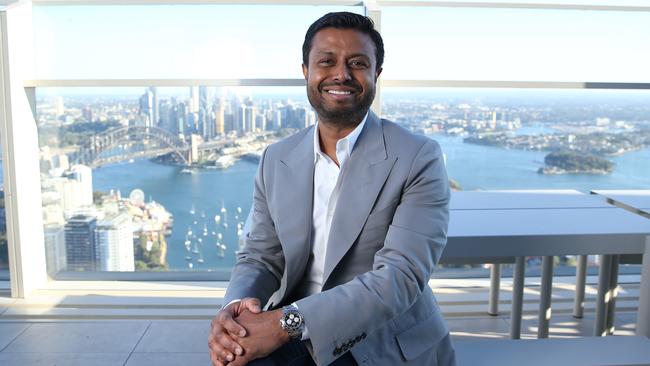Green power a better option than nuclear to power the AI revolution, says AirTrunk’s boss
Renewable projects, such as solar and wind farms, can be commissioned more quickly than nuclear energy reactors, AirTrunk boss Robin Khuda insists.

There is “significant opportunity” for renewable energy projects and battery storage to power the artificial intelligence boom and electricity-hungry data centres before advancing to nuclear energy, AirTrunk boss Robin Khuda believes.
Mr Khuda, 45, has become one of Australia’s most successful tech entrepreneurs after he sold AirTrunk – the data centre business he founded – to US private equity behemoth Blackstone for $24bn, cementing his status among the nation’s elite.
He now says he can build AirTrunk into a $100bn business, as its customers – the world’s biggest tech companies – invest about $1 trillion into data centres during the next five years.
Data centres provide the backbone for artificial intelligence, which requires copious amounts of computing power, as well as electricity and water – prompting environmental concerns about the use of AI.
But Mr Khuda said AirTrunk had earned a reputation for being one of the more sustainable providers, and renewable energy projects combined with battery storage could ease the environmental burden. He said renewable projects, such as solar and wind farms, could be commissioned more quickly than nuclear reactors, which the federal opposition is advocating.
“We’re a big believer of renewable and battery energy storage solutions. Australia is a country where we have enormous land. We get a lot of sun. We get a lot of wind,” Mr Khuda told The Australian.
“If you look at some of the renewable projects, we can get this up and running much, much faster. In the short to medium term, I think we need to invest more into those renewable projects.
“We’re a big believer. Look, we are doing a 30 megawatt project in NSW with Google. We have just done a 200MW project in Hong Kong for Microsoft. We basically bought out 50 per cent of overall renewable supply in Hong Kong. In Malaysia, we’re doing 30MW. We have a pipeline to do another in Australia, Japan – probably another two to three gigawatt over time – so there are a lot of opportunities for those renewable projects with a lot of investment.”
Mr Khuda said all of AirTrunk’s customers – which also include Amazon and Oracle – were committed to net zero by 2030, creating further impetus to invest in renewable energy.
“The need renewable and they’re happy to pay a premium to buy renewable power. And the great thing is, we can go to a renewable energy developer and we can sign up a 20-year contract – because our back-to-back contracts with our customers are 15-20 years. It makes it so easy to kick off a project.”
AirTrunk secured a land allocation to build a 78MW data centre in Singapore before its government issued a moratorium on building new data centres – a ban which has since been lifted.
“Singapore is committed to net zero, the Paris treaty, by 2050. The Singapore government, subsequent to that, released two projects which it called the green Data Centre Project, and I’m pleased to say AirTrunk won two out of two of those projects.
“I think that was testament to our innovation, our approach about renewable sustainability, the high quality offset we are doing.”
Still, there is concern about the ability of renewable energy sources to provide baseload power, particularly during the night when there is no sun to power solar panels and during calm days when there is no wind.
Mr Khuda said battery storage – although expensive – could provide a solution.
“We are working with utilities companies because the challenge with renewables is it’s great during the daytime but it drops at night time. The best solution is the battery energy storage solution.
“We will be announcing some very large investments, base partnering with utility companies to solve that sort of fluctuation of the utilities. So there is a significant opportunity before starting to move to nuclear in my view.”
But Mr Khuda – who had dinner with Anthony Albanese at the Perth home of AirTrunk chairman and Fortescue deputy chairman Mark Barnaba the night before the Blackstone deal was finalised last week – said he wasn’t looking to influence politicians on energy policy.



To join the conversation, please log in. Don't have an account? Register
Join the conversation, you are commenting as Logout